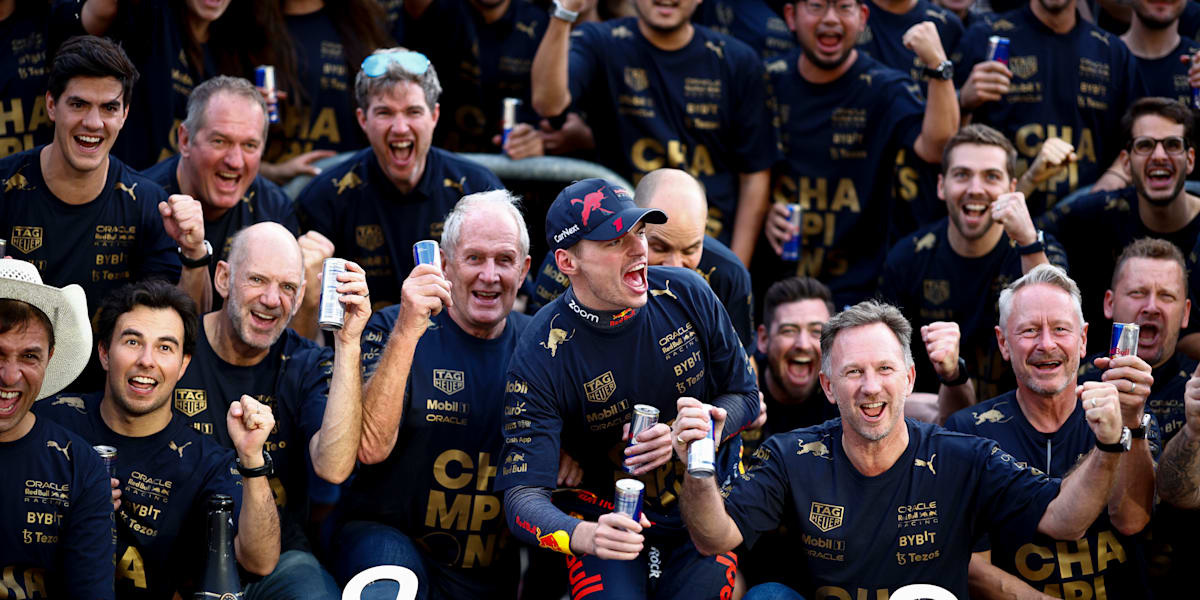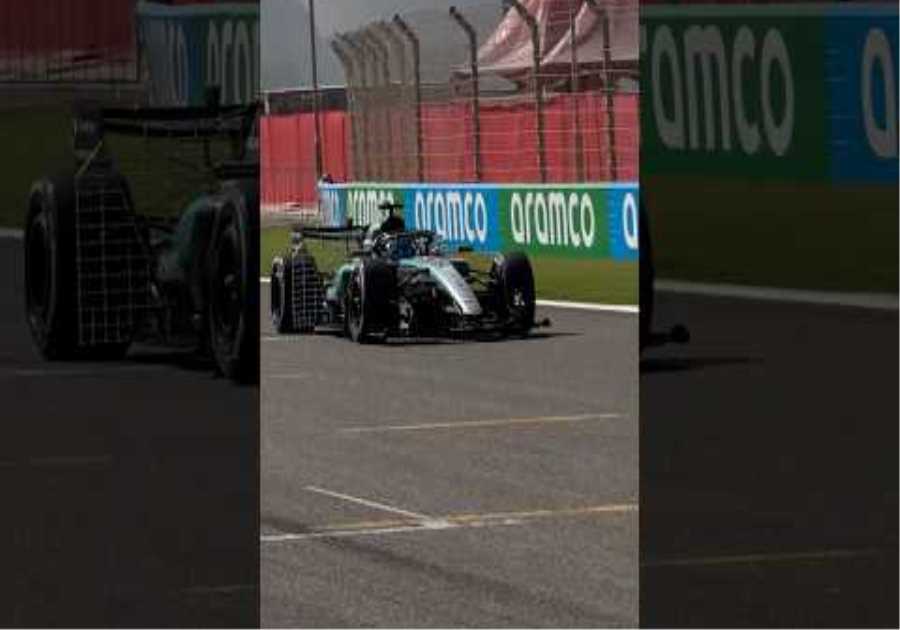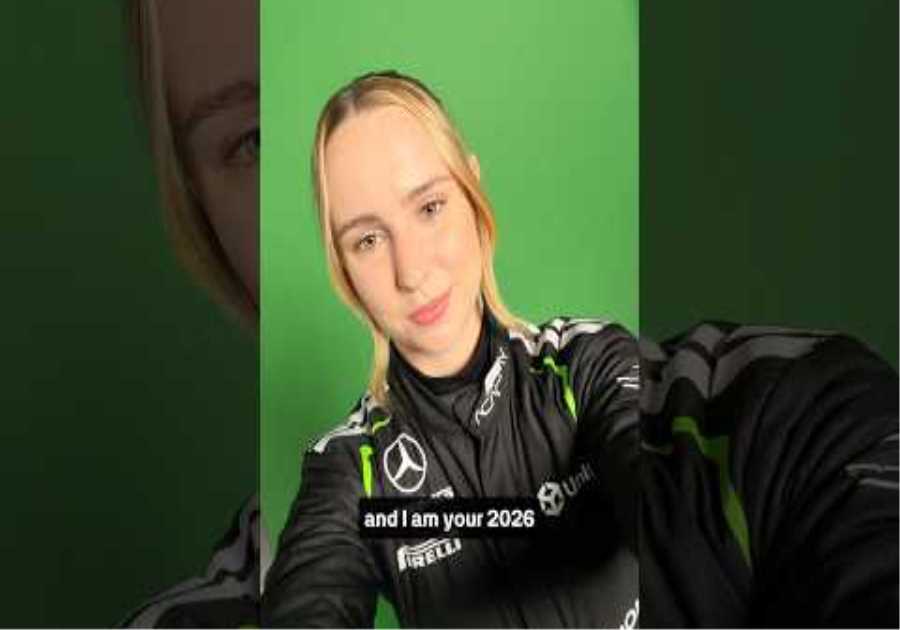
Verstappen’s drivers’ championship last year was a drought-breaker, but also something of an anomaly; it was the only time in the team’s 18-year history that Red Bull hadn’t won the constructors’ title in the same season it had won the drivers’ title. For a team sport, it’s the high-profile individuals behind the wheel who get the majority of the accolades – but for everyone at the team’s Milton Keynes headquarters, sharing group success leaves an even sweeter taste.
Victory at Circuit of the Americas was a fitting way to seal the deal
© Getty Images/Red Bull Content Pool
The 2022 constructors’ title is one that’s been a long time coming – the team won it four times in its first nine F1 seasons, but none in the past eight. It’s also one earned against the backdrop of a significant rule change for this season, one where being in the title fight with a car set for the regulatory scrapheap – as the RB16B was at the end of 2021 – could have pulled the handbrake on the attention and resources allocated for the ‘new era’ of F1 this season.
Straddling the tightrope between focusing on the present and the future was no easy task, yet Red Bull threaded the needle and reaped the rewards.
So how was Red Bull’s fifth constructors’ title won, and what does it mean?
It’s always darkest before the dawn
Winning a constructors’ title three races before the end of a campaign suggests a season of plain sailing, but the early stages were anything but. Both Verstappen and team-mate Sergio Perez retired from the season-opening Bahrain Grand Prixand after the reigning world champion ground to a halt in the Australian Grand Prix in round three, the team sat third in the constructors’ race with just 55 points, 49 shy of runaway leaders Ferrari. Verstappen, meanwhile, was a distant 46 points behind Ferrari’s Charles Leclerc in the drivers’ standings.
Imola – and a first 1-2 of the season – was a turning point
© Getty Images/Red Bull Content Pool
It was a pair of leads that would never be relinquished, with Verstappen securing a second drivers’ title at Suzuka in the Japanese Grand Prix after what was – fittingly, in Honda’s backyard – another 1-2 for the team, a fifth of 2022 in 18 starts. For context, the team had never taken more than three 1-2 finishes in a single season before, after Sebastian Vettel and Mark Webber locked out the top two spots on the podium three times in 2009, 2010 and 2013.
Going faster by standing still
It’s not all about what the stopwatch says when you’re roaring around the track; it’s how fast you can get back onto it after you’ve stopped that’s arguably just as important. And for the second year running, Red Bull’s pit stop prowess has been unsurpassed.
After a 2021 season where the team had the fastest pit stop all year (Verstappen’s 1.88 seconds stop in Hungary) and recorded the quickest stop in 13 of 22 Grands Prix, there was no guarantee that ascendancy would repeat itself this year, with the new for-2022 rules stipulating larger wheels and tires that added at least 40 kilograms to each car.
Gone in 2.09 seconds – Pérez was out in a flash at Zandvoort
© Getty Images/Red Bull Content Pool
It was potentially a weighty problem, but one Red Bull made light work of it. Again, the team recorded the fastest stop of the year (Pérez’s 2.09 seconds stop in the Netherlands), and in eight of the 19 races to date, a Red Bull driver has had his car serviced and sent faster than anyone else. When you’re dealing with the finest of fine margins, every millisecond matters.
In 18 F1 seasons, a prettier set of stats has never been accumulated for Red Bull. Consider: the team’s points tally to date (656), number of wins (15) and podium finishes (24) are all single-season highs, while between them, Verstappen and Pérez have led for 645 laps; the other drivers combined have led for 449.
At least one of Verstappen or Pérez has been on the podium for 17 straight races – another high-water mark for the team – while if you really want a number to ponder, consider that the last time the team didn’t have at least one car make Q3 was the Russian Grand Prix of 2018 – 84 races ago.
A Red Bull in the lead was a common sight in 2022
© Getty Images/Red Bull Content Pool
Oracle Red Bull Racing chief technical officer Adrian Newey has now been involved in 23 F1 world championships in his storied career as the sport’s sharpest engineering mind, but the RB18 is his most successful creation yet, in terms of winning percentage of victories earned from races started . When you consider the history-making cars he had his fingerprints all over at Williams and McLaren before he came to Red Bull, that’s some statement.
For a sport that has been running for 72 years, Red Bull is relatively young by F1 standards, but 11 combined F1 world drivers’ and constructors’ championships in 18 years shows the team is a force both for this time, and all time.
After a 2005 debut, Red Bull rapidly become the sport’s sixth-most successful team all-time in terms of titles; only Lotus (13 combined crowns), Williams (16), Mercedes (17), McLaren (20) and Ferrari (31 as the oldest-surviving team in F1 history, having competed in every season since 1950) are ahead in the all- time annals.
Red Bull’s first title double? Sebastian Vettel in 2010
© Getty Images/Red Bull Content Pool
Red Bull sits fifth in the all-time wins list with 90 victories; Verstappen (33 victories) is almost closing on Sebastian Vettel’s 38 wins with the team, although Vettel’s four world titles from 2010-13 will always be remembered as the time the team became – and stayed as – a major front-running force.
Numbers tell one story, but Oracle Red Bull Racing team principal Christian Horner has the words to put 2022 into perspective.
As the head of the team since that 2005 debut, Horner has enjoyed every success – and squirmed through every setback – since 2005, meaning his musings on just what 2022 means matter most.
The boss has had a smile on his face all season
© Getty Images/Red Bull Content Pool
“After eight long years, this means everything to us,” he said.
“It’s been such a journey. We’ve had the tough years, we’ve had to keep picking ourselves up and dusting ourselves off. The hard work, the blood, sweat and tears that have gone into this – this one means the world to us.”











